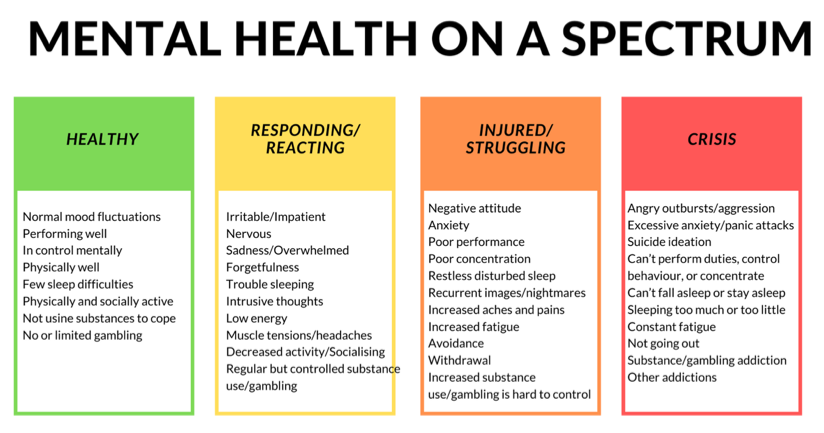“I wish people realized that everyone has mental health”
When the term “Mental Health” is mentioned, more often than not, there is a negative connotation attached to it. Especially in the context of Singapore, topics concerning Mental Health and Mental Illness are still rarely discussed in public. As such, it is common that people often confuse “mental health” and “mental illness”, combining the two terms and using them interchangeably as if they mean the same thing.
However, before we can understand the difference between the two terms, it is crucial to define Mental Health.
According to the WHO (World Health Organization), mental health is:
“… a state of well-being in which the individual realizes his or her own abilities, can cope with the normal stresses of life, can work productively and fruitfully, and is able to make a contribution to his or her community.”, but also that mental health “is not just the absence of mental disorder.”
Having read WHO’s definition of mental health, it does clarify and expound more on what mental health entails. It is about time we STOP being afraid of the two tiny words “mental health” because everyone has mental health. In this post, there are 3 main takeaways that could perhaps change the way we view mental health.
1. Everyone has mental health
While Mental Health is often viewed as part of individuals with Mental Illness, the truth is that everyone, has mental health. Just as we all have physical health and emotional health, mental health is just one of the types of health that make up who we are. Infact the definition of Mental Health, according to Medical News Today, refers to our cognitive, behavioural, and emotional wellbeing – it is simply about how we think, feel, and behave (Newman, 2017).
As the first Director-General of the World Health Organization (WHO) famously says, “without mental health there can be no true physical health” (Outline for a Study Group on World Health and the Survival of the Human Race
1954), indeed we now have strong evidences to highlight the bidirectional relationship between mental illnesses and physical healthoutcomes. Therefore, just as we see a doctor for physical illnesses, ought not we also find some help if we are experiencing poor mental health?
2. Mental health exists on a spectrum
Health, regardless which aspect of it, isn’t simply and on/off switch. When we catch a cold, have a stomach flu, etc, physical ailments affect our health to different degrees. People move on a continuum ranging from good health to average, or so-so health to poor health, to illness or disability. This is exactly the same as mental health. There are some days we feel a little down, or stressed out about school, or even grieving over a break up or the loss of a loved one. People also range from good mental health, to average mental health and even poor mental health. However, it is also important to note that good mental health doesn’t equate to being happy 100% of the time, but it is about being able to cope well.

3. Poor mental health does not necessarily mean you have mental illness
“Mental Health” and “Mental Illness” are often used interchangeably as if they mean the same thing, but they do not. (Hinde, 2019)
According to Canadian Mental Health Association (CMHA), mental health (or mental well-being) refers to “our emotions, thoughts and feelings, our ability to solve problems and overcome difficulties, our social connections and understanding the world around us.
On the other hand, mental illness refers to an illness that affects and/or impairs the way people think, feel, behave and/or interact with others.
It is important to note that even though everyone will experience some sort of struggle with their mental health, it doesn’t mean everyone will experience a mental illness. However, prolonged poor mental health, without adequate healthy coping mechanisms to overcome struggles could eventually lead to mental illness. As such, seeking mental health treatment is not a sign of weakness, but simply a prevention effort to prevent future development of mental illness. Just as we pop a pill for a small cold to prevent a fever, mental health needs to be nursed and cared for as well.
In conclusion, mental health is indeed universal and it’s about time we start understanding mental health for what it is instead of what we think it is.
One in seven people in Singapore have experienced a mental disorder (Choo, 2018), but 7 in 7 have mental health.
I am Asian and Emotionally Distressed. Am I allowed to seek help for my problems?
Understanding Stigmatization in Singapore Around Mental Illness
https://inpsychful.sg/mental-toughness-coaching/
References:
Canadian Mental Health Association. (n.d.). What’s the difference between mental health and mental illness? Retrieved from https://www.heretohelp.bc.ca/q-and-a/whats-the-difference-between-mental-health-and-mental-illness
Choo, C. (2018, December 11). More people in Singapore have experienced a mental disorder in their lifetime, study finds. Retrieved from https://www.todayonline.com/singapore/more-people-singapore-have-experienced-mental-disorder-their-lifetime-study-finds
Hinde, N. (2019, October 10). What’s The Difference Between Mental Health And Mental Illness? Retrieved from https://www.huffingtonpost.co.uk/entry/whats-the-difference-between-mental-health-and-mental-illness_uk_5d3991fae4b020cd994f55ee
Newman, T. (2017, August 24). Mental health: Definition, common disorders, and early signs. Retrieved from https://www.medicalnewstoday.com/articles/154543.php
Outline for a Study Group on World Health and the Survival of the Human Race. Material drawn from articles and speeches by Brock Chisholm. Geneva: World Health Organization; 1954. Available from: whqlibdoc.who.int/hist/…/ChisholmBrock_1953_Compilation.pdf [accessed 6 December 2012].
